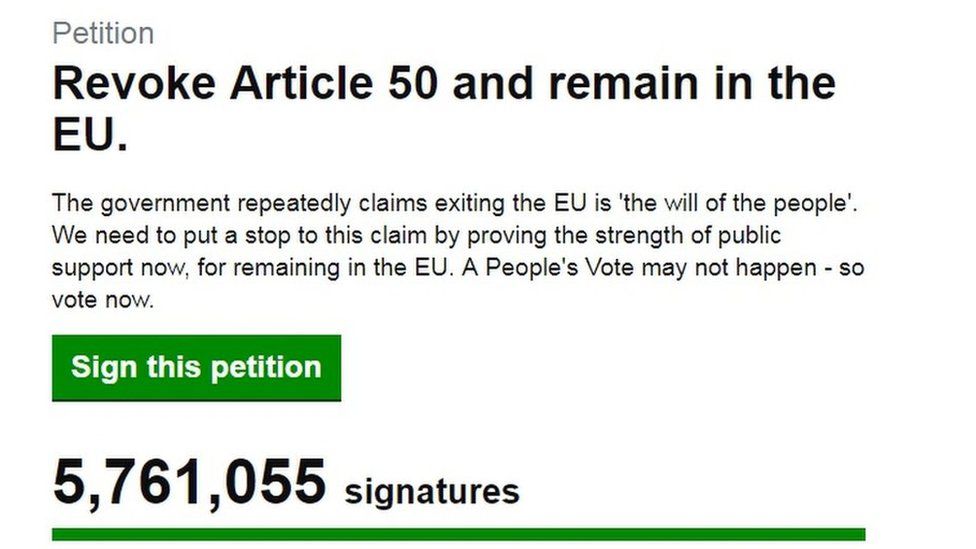Brexit: Petition to revoke Article 50 to be debated next week
- Published

The government has officially responded to the record-breaking petition calling for Brexit to be cancelled, which will be debated by MPs next week.
The petition, which has passed more than 5.75m signatures, has been scheduled for debate on Monday, 1 April along with two other Brexit petitions.
Responding, the government said it "acknowledges the considerable number of people" who have signed it.
But revoking Article 50 would "break the promises" made to voters, it said.
The petition on the UK Parliament's website - started by retired lecturer Margaret Georgiadou - calls on the government to revoke Article 50, the two-year process which is triggered when a country wants to leave the EU.
It is the most-signed petition ever to be submitted on the website.
Mrs Georgiadou, 77, responded to a date being set for the debate by calling for more signatures, adding: "The battle draws nigh again."
Any petition which gathers 100,000 signatures or more will be debated by MPs.
On Tuesday, the Petitions Committee - which is in charge of considering the petitions submitted - announced that it has been scheduled to be debated in Westminster Hall at 16:30 GMT on Monday.
Debates will also take place on two other petitions:
- One, which has passed 120,000 signatures, calling to hold another EU referendum
- Another, which has passed 140,000 signatures, calls for the UK to leave the EU with or without a deal on the original Brexit date of 29 March
The committee said it decided to combine the three petitions into one single debate to ensure they were debated as soon as possible, "so they would be less likely to be overtaken by events".
It comes as MPs in the House of Commons prepare to start voting on alternative Brexit plans on Wednesday.
The UK had been due to leave the EU on Friday, but both sides have agreed to postpone Brexit until a later date to give the UK more time to either approve Prime Minister Theresa May's Brexit withdrawal deal or decide its next steps.
Mrs May's deal - which she negotiated with the EU - has been rejected twice by Parliament. She is considering asking MPs to vote on it for a third time, in the hope that enough of them have changed their minds to get it passed.
If MPs pass it, the UK will leave the EU on 22 May with a deal. If it is not passed the government has until 12 April to propose a different way forward to the EU.
Hundreds of thousands of people marched in London calling for another EU referendum
In its response to the petition, the government's Department for Exiting the European Union said: "This government will not revoke Article 50.
"We will honour the result of the 2016 referendum and work with Parliament to deliver a deal that ensures we leave the European Union."
The statement said cancelling Brexit and staying in the EU would "undermine both our democracy and the trust that millions of voters have placed in government.
"The government acknowledges the considerable number of people who have signed this petition.
"However, close to three quarters of the electorate took part in the 2016 referendum, trusting that the result would be respected... 17.4 million people then voted to leave the European Union, providing the biggest democratic mandate for any course of action ever directed at UK Government."
It added: "Revoking Article 50 would break the promises made by government to the British people, disrespect the clear instruction from a democratic vote, and in turn, reduce confidence in our democracy."
Mrs Georgiadou, who previously said she had received death threats for creating the petition, tweeted: "Show your mettle and go garner more votes!"
Allow Twitter content?
This article contains content provided by Twitter. We ask for your permission before anything is loaded, as they may be using cookies and other technologies. You may want to read Twitter’s cookie policy, external and privacy policy, external before accepting. To view this content choose ‘accept and continue’.
Allow Twitter content?
This article contains content provided by Twitter. We ask for your permission before anything is loaded, as they may be using cookies and other technologies. You may want to read Twitter’s cookie policy, external and privacy policy, external before accepting. To view this content choose ‘accept and continue’.
- Published26 March 2019
- Published23 March 2019
- Published18 October 2019
- Published23 March 2019
- Published22 March 2019